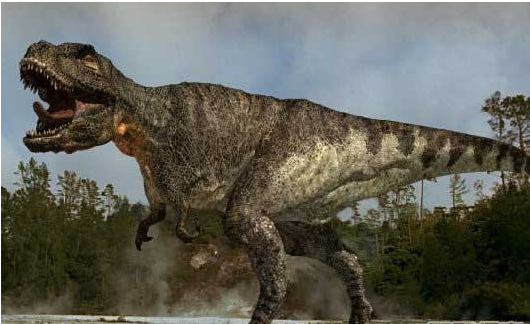Gastonia, being a large animal, was very stocky and well-muscled.
加斯顿龙,作为一个大型动物,非常健壮、肌肉发达。
Utahraptor, for a predatory dinosaur, particularly a Dromaeosaur, it's a very strong powerfully-built animal as well.
犹他盗龙,作为掠食性恐龙,特别一个驰龙,也是非常健壮有力的动物。
The squat four legged Gastonia's heavy load slows him down to four to five miles per hour.
四足矮壮的加斯顿龙沉重的负荷使它的速度只有每小时4到5英里。
In contrast, the two-legged Utahraptor is swift.
与之相反,两足的犹他盗龙是迅速的。
He can sprint at speeds up to 20 miles per hour.

There is nothing fast or agile about Gastonia.
加斯顿龙跟速度和敏捷完全不搭边。
He's built like a little Sherman tank.
它的构造就像是一辆小型谢尔曼坦克。
He's very slow, he's very heavy, he plods along, he doesn't really need to be agile or fast.
它非常缓慢,身躯沉重,步伐蹒跚,它根本用不着变得敏捷或迅速。
Utahraptor, on the other hand, is a pretty fast, agile dinosaur.
犹他盗龙,则刚好相反,是相当迅速敏捷的恐龙。
He's got to be because he's hunting and chasing prey.
它必须这样,因为它要追逐捕食猎物。
His body is designed to be quick.
它的身体就是为了快速而设计的。
His long, stiff tail helps counterbalance him so he's a very quick, very agile and very fast dinosaur.
有又硬又长的尾巴能帮助保持平衡,它是非常迅速而灵活的恐龙。
It's very rare to find complete skeletons.
很难得找到完整的骨架。
Paleontologists rely on cast replicas to fill in the missing parts.
古生物学家靠制作副本来填充缺失部分。
By making life-size replicas of these ancient creatures, researchers can develop a better visual picture of how and why they fought for survival.
通过制作这些远古生物真实尺寸的副本,研究者能够对它们如何及为什么进行生存斗争建立一个更好的视觉图像。
Casts are really important in the sense that it allows an exchange of information among universities and researchers and school children and enthusiasts.
模型在一定程度上很重要,它能在大学、研究者学校学生和恐龙爱好者之间形成信息交换。
Also seeing casts mount in museums is really great because it allows the bones to stay in an area where researchers can go in and look at the individual bones.
同样看见模型放置在博物馆里也非常好,因为这让骨头待在一个研究者们能进去看每一块骨头的地方。
It really helps shed new light on new discoveries.
这真的能帮助给新发现带来启发。
Utahraptor stood upright and moved on two legs which made him far more agile than the four legged Gastonia.
犹他盗龙用两足直立移动,这让它远比四足行走的加斯顿龙要更加灵活。
So if you can envision a battle between an animal like Utahraptor, with the classic predatory tools at its disposal, and Gastonia, which is an animal that was not fast, it was a quadruped, would just sort-of stay put, and hunker down, and basically make it too difficult for the Utahraptor to get a meal out of it.
要是你想象一场恐龙大战,一方是有着经典的掠食性工具任他处理的犹他盗龙,另一方是加斯顿龙,是一种速度不快的动物,它是四足动物,它就是待在那里,放低身体,基本上使犹他盗龙很难从它身上获得一块肉。
To make a modern analogy, think of Utahraptor as a wolf and Gastonia as a porcupine.
做一个现代的类比,可以把犹他盗龙当成狼而加斯顿龙当成是豪猪。
In order to attack the porcupine, the wolf is going to have to be incredibly careful in choosing how and when he's going to attack.
为了能够攻击豪猪,狼必须非常小心地选择如何攻击和何时攻击。
But as for the Porcupine, he can just sit there and wait.
不过对于豪猪,它只要坐在那里等待。
Well, that is basically what we have in Utahraptor and Gastonia.
那基本上就是犹他盗龙和加斯顿龙的情况。
One has to do all the work and stands to lose a lot, and the other just sits by and waits.
一方必须做所有的工作并坚持着失去很多(能量),另一方则只要坐着等待。



